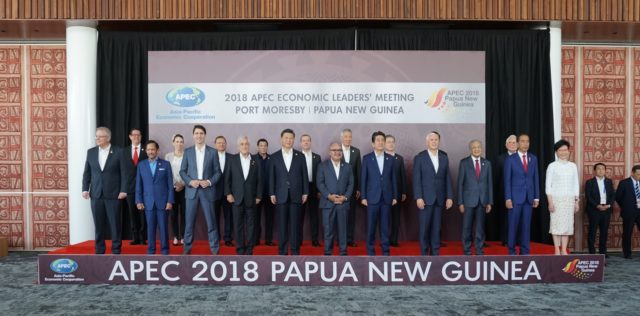Leaders of the 21 Asia-Pacific Economic Cooperation (APEC) economies on November 18 were unable to produce a joint statement at the 26th APEC Economic Leaders’ Meeting amid conflicting views over trade, security, and investment issues that were voiced by the U.S. and China throughout the gathering of the regional heads.
For the first time in the history of APEC, the leaders failed to come up with a formal joint declaration at the conclusion of the Port Moresby summit in Papua New Guinea (PNG) because of differences between the major powers.
Speaking at a closing press conference, Papua New Guinea Prime Minister Peter O’Neill said that as APEC host, he would release a chairman’s statement later in the day, reported VNA.
O’Neill said the reform of the World Trade Organization (WTO) was the main issue causing differences among the APEC leaders.
“The leaders agreed that instead of a traditional leaders’ declaration, they would leave it to the hands of PNG as the chair to issue a chair statement on behalf of all the members,” said Zhang Xiaolong, a spokesman from the Chinese foreign ministry.
Canada’s Prime Minister Justin Trudeau admitted that different visions on particular elements with regard to trade hindered the release of a statement document.
The annual gathering, held for the first time in Papua New Guinea since it joined the forum in 1993, was overshadowed by trade differences and competition for greater influence in the Pacific region between the U.S. and China.
U.S. Vice President Mike Pence warned smaller countries not to be seduced by China’s massive Belt-and-Road infrastructure program, which sees Beijing offering money to poorer countries for construction and development projects, reported Channel NewsAsia.
In a speech to business leaders just minutes before Pence, Chinese President Xi Jinping insisted the initiative was not a “trap” and there was no “hidden agenda,” amid criticism that it amounts to “chequebook diplomacy” in the region.
Xi also lashed out at “America First” trade protectionism, saying it was a “short-sighted approach” that was “doomed to failure.”
However, Pence and Xi had held talks twice during the APEC summit, Pence told the press.
At the leaders’ meeting, themed “Harnessing Inclusive Integration, Embracing the Digital Future,” the heads of the 21 member economies discussed measures to enhance integration, maintain comprehensive growth, and promote the digital economy.
APEC groups Australia, Brunei, Canada, Chile, China, Hong Kong, Indonesia, Japan, South Korea, Malaysia, Mexico, New Zealand, Papua New Guinea, Peru, Philippines, Russia, Singapore, Taiwan, Thailand, United States, and Vietnam.
Photo courtesy of APEC









